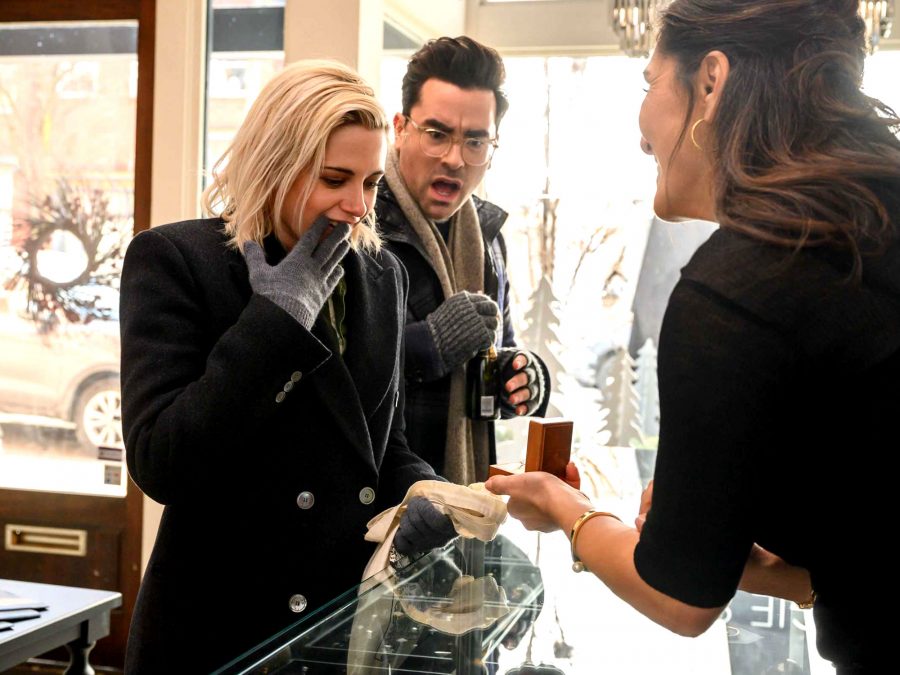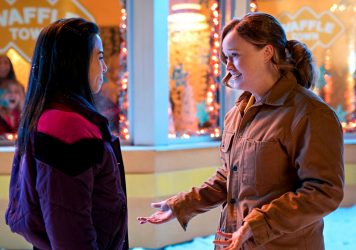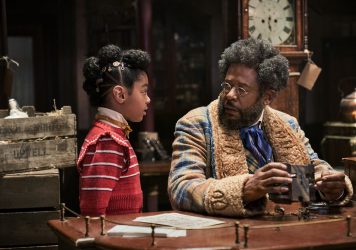Kristen Stewart and Mackenzie Davis star in Clea DuVall’s festive rom-com about going home and coming out.
In an ideal world, Christmas paraphernalia (decorations, films, songs and, yes, mince pies) would only surface between the period of 1-31 December. In that same world, a holiday movie starring a same-sex couple wouldn’t be a news story, it would be an accepted part of the release schedule, to be evaluated accordingly based on its merits.
But we’re not there yet; Christmas might as well start the day after Halloween, and although things do seem to be heading in the right direction as far as on-screen representation is concerned, it’s at a slow enough rate that it still feels novel when a filmmaker is able to make a queer holiday movie – let alone one that receives a sizeable distribution and marketing budget.
Last year brought us Let It Snow and Season of Love, but Clea DuVall’s Happiest Season feels decidedly more high profile thanks to its starry cast. Kristen Stewart and Mackenzie Davis play Abby and Harper, a lesbian couple who live together in Pittsburgh and decide to spend the holidays with Harper’s family in a quaint Pennsylvania town where things like mayoral elections and white elephant parties are the most important events in the social calendar. It also transpires that – despite having told Abby a different story – Harper is yet to tell her parents she’s gay, or that she is in a long-term relationship.
In an impressive display of patience and understanding, Abby agrees to keep her girlfriend’s secret, posing as Harper’s “orphan friend” when they arrive at her parent’s house, where preparations are underway to secure patriarch Ted (Victor Garber) funding for his upcoming mayoral run. Harper’s mother Tipper (Mary Steenburgen) is a non-nonsense perfectionist obsessed with presenting the image of a perfect family, while Harper’s sisters Sloane and Jane (Alison Brie and Mary Caldwell) present their own unique challenges which the couple have to contend with.
Add some comical awkward run-ins with exes and a few small-minded local-townsfolk, and the stage is set for a festive comedy about the difficulties of navigating familial relationships during the purported most wonderful time of the year. It’s a dynamic that’s set the stage for Christmas movies for years, from It’s a Wonderful Life to Elf; most holiday classics come down to the fraught relationships between our nearest and dearest.

As such, Happiest Season is a fairly conventional holiday jaunt, although it’s elevated by Stewart and Davis’ chemistry and a wonderfully committed turn from Mary Steenburgen as the overbearing mother from one hundred Pinterest-fuelled nightmares. Rather than innovating, the story is more about the telling – DuVall achieves some sweet moments and memorable slapstick gags, even if the creepy Grady twins who torment Abby feel far-fetched even for the fantastical likes of the Christmas genre.
Coming out to family members is still a very real part of life for many LGBT+ people, and it can be an incredibly painful experience. The film’s greatest strength is how it highlights that it doesn’t always go to plan, and that’s okay too. In one of the film’s more touching moments, Abby’s friend John (Dan Levy) recalls his own coming out story, and how his father stopped talking to him for years because he’d rather have no son than a gay one. While representation in studio films often feels like a cynical attempt at cashing in or checking a box, at least Happiest Season is sincere; an earnest, endearing story about the pressure we put on ourselves to perform perfection.
And that’s the thing: I don’t really care that Happiest Season is predictable, or that every loose end is tied up neatly with a festive bow. As much as criticism is about dissecting writing and acting and cinematography, it’s also about understanding the film landscape, and what movies like Happiest Season mean in a wider context. LGBT+ people deserve to see themselves on screen in cheesy rom-coms as much as in arthouse dramas like Carol. And particularly after the unrelenting onslaught of misery that 2020 has been, it feels pretty nice to watch a film where a family acknowledges a need to work through their disfunction, and a lesbian couple get their happily ever after.
Published 22 Nov 2020
Love the prospect of Stewart and Davis together.
Mary Steenburgen MVP.
A sweet tonic for the winter blues.

This misjudged yuletide rom-com does a gross disservice to George Michael’s musical legacy.

Let It Snow and Season of Love bring female queer romance to the fore.

Forest Whitaker stars as a down-on-his-luck toymaker in David E Talbert’s festive family frolic.